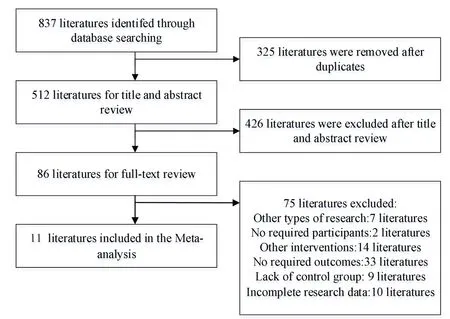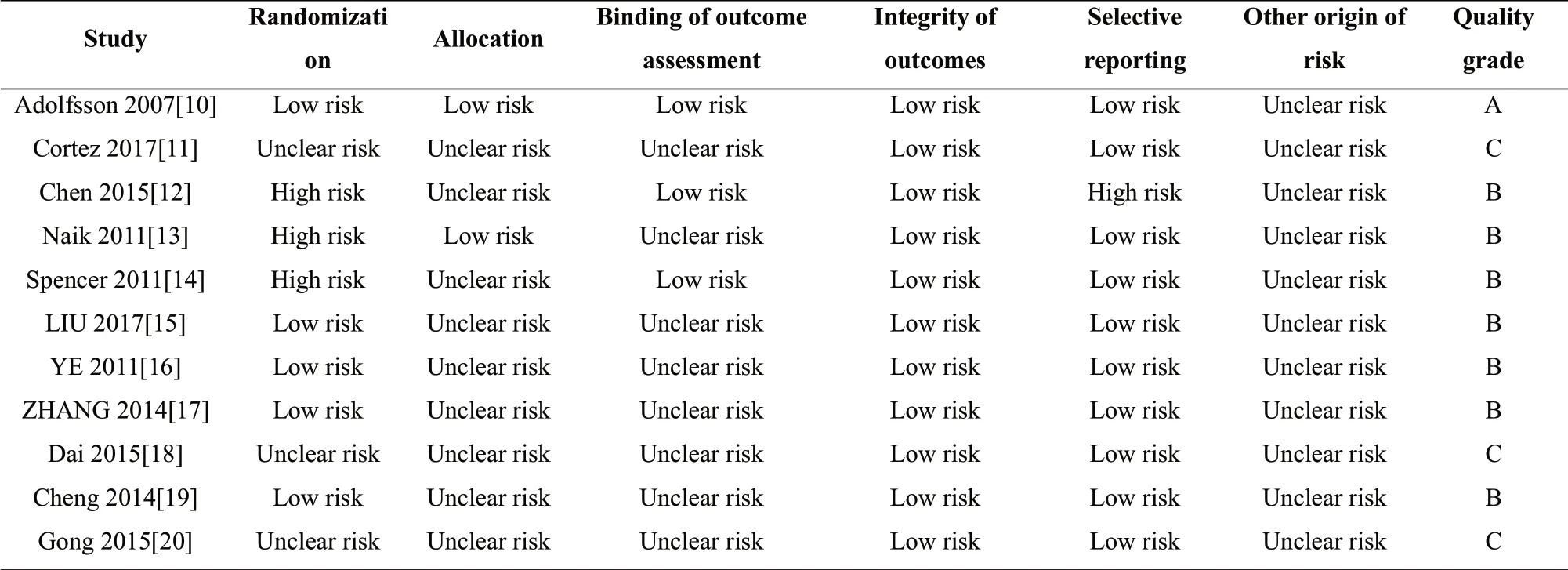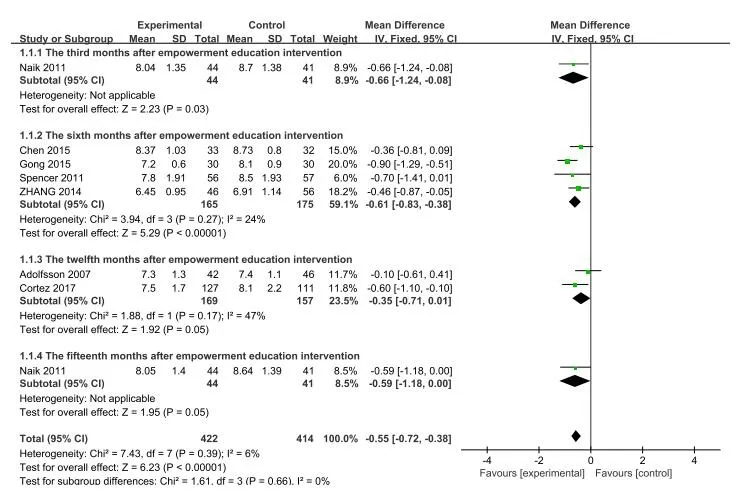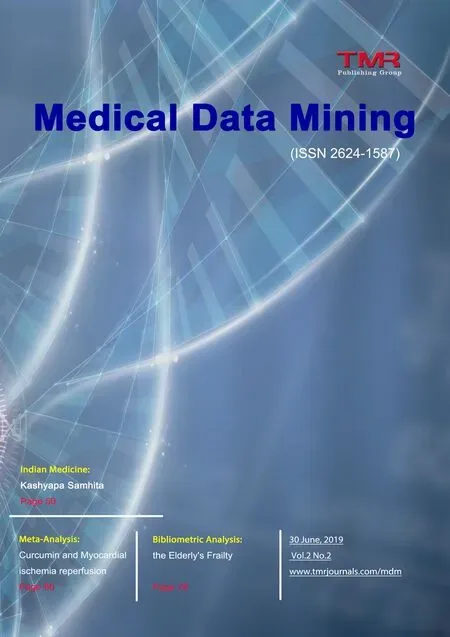Efficacy of empowerment education in self-management with Type 2 Diabetes Mellitus: A systematic review and meta-analysis
2019-07-16YuDiCaoKeJiaLiuYueHuLiJiaoWei
Yu-Di Cao, Ke-Jia Liu, Yue Hu, Li-Jiao Wei
School of Nursing, Tianjin University of Traditional Chinese Medicine, Tianjin, 300193, China.
Abstract Objective:To evaluate the impact of empowerment education in self-management with Type 2 Diabetes Mellitus.Methods:A literature search was performed in PubMed, Web of Science, Cochrane Library, mbase, China National Knowledge Infrastructure (CNKI),WanFang Data, CQVIP and China Biology Medicine disc (CBMdisc) and for randomized controlled trials published before November 2018. RevMan5.3 software was used for metaanalysis.Results:A total of 11 articles were included, involving 1139 patients. The group of empowerment education included 574 participants, and the regular education groups 565 participants. Meta-analysis showed that the group of empowerment education has an advantage over the control group in the levels of self-efficacy [MD= 17.55, 95%CI(14.14,20.96), P<0.00001], self-management [SMD=0.85, 95%CI(0.60,1.11),P<0.00001] , as well as the effectiveness of short-term empowerment education(within 6 months ) on reducingbA1c ( P<0.05); however failed to long-term empowerment education (beyond 12 months)(P= 0.05).Conclusion:This meta-analysis indicates that empowerment education can be an acceptable and appropriated nursing intervention for type 2 diabetes mellitus patients.
Keywords:Empowerment education, Type 2 Diabetes Mellitus, Self-management, meta-analysis
1 Introduction
Diabetes Mellitus is a group of metabolic diseases characterized by hyperglycemia resulting from defects in secretion and/or action of insulin [1]. The International Diabetes Federation (IDF) estimated global diabetes patients have reached 451 million in 2017, which were expected to increase to 693 million by 2045 [2]. People with diabetes have an increased risk of developing a number of serious life-threatening health problems resulting in higher medical care costs,increased mortality and reduced quality of life. Type 2 diabetes mellitus (T2DM) comprises 90-95% of all diabetes diagnoses among adults [3].
T2DM is a chronic condition that requires continuous medical care, permanent education for self-management of the disease. Self-management is the foundation of T2DM management. Continuous and effective selfmanagement can control the blood level of glycemia and reduce the risk of long-term complications [4].American Diabetes Association (ADA) recommended that empowerment education for self-management of diabetic patients [5].
Empowerment education means promoting patients self-management to maximize the individuals potential for wellness and personal health by educating,researching information about the disease and being an active participant in treatment decisions [6].Empowerment enables people to decide about the options provided by nurses. Research performed on patients diagnosed with T2DM have shown that empowerment helps them to achieve clarity about their goals, values and motivations, facilitating the acquisition of good metabolic control [7-8]. Several studies have described the impact of empowerment education training in T2DM patients, however, the results of empowerment education training in treatment of T2DM were inconsistent. Therefore, the purpose of this study was to appraise the efficacy of empowerment education training in patients with T2DM by metaanalysis.
2 Materials and methods
2.1 Inclusion criteria
(1) Types of participants:
The participants of interest were adults at least 18 years old diagnosed with T2DM.
(2) Types of interventions:
The experimental group: This meta-analysis considered studies evaluating the effects of empowerment education in patients with T2DM. The content of intervention includes disease knowledge management, self-skill management and emotion management. The method was carried out in five steps of empowerment education: clarifying questions,expressing emotions, setting goals, making plans, and evaluating results.
The control group: Routine health education methods for diabetes, such as free consultation and distribution of health education materials.
(3) Types of outcomes:
Outcomes included: Glycated Hemoglobin (HbA1c),Insulin Management Diabetes Self-Efficacy Scale(IMDSES), Type 2 Diabetes Self-Care Scale (2-DSCS).
(4) Types of studies:
This meta-analysis included controlled trials,particularly RCTs. Study languages were English and Chinese.
2.2 Exclusion criteria
(1) Reviews, abstracts and duplicate publications;
(2) The participants had severe diabetic nephropathy or other complications;
2.3 Search strategy
To identify potentially eligible studies from their inception to November 2018, two researchers searched PubMed, Web of Science, Cochrane Library, Embase,CNKI, WanFang Data, VIP and CBM Data, with English and Chinese language restriction. The terms“Diabetes Mellitus”, “Type 2 Diabetes Mellitus”,“Diabetes Mellitus, Type 2”, “Self-Management,”“Self-Care”, “Self-Administration”, “behavior change”, “empowerment”, “empowerment theory”,“empowerment education”, “patient empowerment”,“randomized controlled trial”, “randomized”, “placebo”jointly used as MeSH terms or free texts terms. Chinese search terms include: “糖 尿 病” OR “2 型 糖 尿 病”AND “自我管理” OR “自我护理” OR “自我照护” OR “自我行为” OR “行为改变” AND “授权”OR “授权教育” OR “授权理论” OR “患者授权”Furthermore, we also conducted additional search from grey literature databases.
2.4 Data extraction
All relevant data were screened independently by two reviewers. If there is a disagreement, the discussion will be settled or settled by a third researcher. The following information was extracted from each study including the basic information of literatures enrolled, sample size, intervention characteristics (such as intervention contents and methods), assessment time and relevant clinical outcomes.
2.5 Quality assessment
Cochrane Risk of Bias Assessment Tool was used to evaluate literatures [9]. The Cochrane Risk of Bias Assessment Tool comprised randomization,performance bias, detection bias, attrition bias,reporting bias, outcome bias and other bias. Quality grade A if it fully meets the above standards; If some of them meet the above standards, the quality grade is B; If the above standards are not met completely, the quality grade shall be grade C.
2.6 Statistical analysis
The meta-analysis was performed by RevMan 5.3.Statistical heterogeneity among studies was assessed using Chi-square (χ2) test and I-squared (I2) statistics.P>0.05 or I2<50% was considered homogeneous and fixed effect models were used. Otherwise, a random effect model was used. When the heterogeneity is obvious, subgroup analysis, sensitivity analysis or descriptive analysis would be used. Continuous data was expressed as mean difference (MD) or as standardized mean difference (SMD), with the associated 95% confidence interval (95%CI).
3 Results
3.1 Studies selected
We obtained 837 literatures through initially search.After eliminating duplicate literature by EndNote X7 software, 512 papers remained. Reviewers judged 86 as potentially eligible at full text screening. Of these,eleven reports involving 1139 participants proved eligible and are included in the final analysis. The process of selecting eligible articles was presented in Figure 1.

Figure 1. The search and selected progress of literatures

size(T/C)time Intervention Intervention group Control group Adolfsson 2007[10]88(42/46)7 months Content:Diabetes Health Education Guided by Empowerment Theory Method:Group meetings,Face-to-Face interviews Routine health education methods The twelfth month 1.HbA1c Cortez 2017[11]238(127/111)12 months Content:Diabetes Health Education Guided by Empowerment Theory Method:Ten empowerment meetings(120 min/time)Routine health education methods The twelfth month 1.HbA1c Chen 2015[12]65(33/32)3 months Content:Diabetes Health Education Guided by Empowerment Theory Method:Three face-to-face interviews (60-70 min/time) and nine telephone follow-up visits(30-40 min/time)Routine health education methods The sixth month 1.HbA1c 2.2-DSCS Naik 2011[13]85(44/41)3 months Content:Diabetes Health Education Guided by Empowerment Theory Method: Four group meetings (60-minute group interaction and 10-minute face-to-face consultation)Routine health education methods The third and fifteenth month 1.HbA1c Spencer 2011[14]113(56/57)6 months Content:Diabetes Health Education Guided by Empowerment Theory Method:Empowerment meetings,group discussion and home visits Routine health education methods The sixth month 1.HbA1c LIU 2017[15]124(63/61)6 months Content:Family Visit Based on Empowerment Theory Method: Two intensive visits (40-45 minutes), one home visit (25-35 minutes),and one telephone follow-up(10-20 minutes)Routine health education methods At the end of intervention 1.2-DSCS YE 2011[16]75(38/37)6 months Content:Diabetes Health Education Guided by Empowerment Theory Method: Six empowerment education courses (90 min/time) and six telephone follow-up visits(5-10 min/time)Routine health education methods The sixth week ,third and sixth month 1.HbA1c 2.IMDSES ZHANG 2014[17]102(46/56)6 weeks Content:Diabetes Health Education Guided by Empowerment Theory Method: Two empowerment education courses (40 min/time) and group guidance(40 min/time)Routine health education methods The sixth month 1.HbA1c 2.2-DSCS Dai 2015[18]104(52/52)Not mentioned Content:Diabetes Health Education Guided by Empowerment Theory Method:Empowerment education course Routine health education methods At the end of intervention 1.2-DSCS Cheng 2014[19]85(43/42)2 weeks Content:Diabetes Health Education Guided by Empowerment Theory Method:Five empowerment education course Routine health education methods The first month 1.2-DSCS 2.IMDSE Gong 2015[20]60(30/30)6 months Content:Diabetes Health Education Guided by Empowerment Theory Method: Eight empowerment Education Courses (90 min/time) and Six Telephone Follow-up Routine health education methods The sixth month 1.HbA1c 2.IMDSE Table 1 Basic characters of literatures
3.2 Study characteristics and bias risk
Eleven RCTs are included in this meta-analysis and 1139 patients were included. Eight studies [10-14, 16,17, 20] reported the effect of empowerment education on HbA1c in T2DM patients. Three studies [16, 19,20] reported the impact on patients' self-efficacy. Five studies [12, 15, 17-19] reported the impact on patients'self-management ability. Basic characters of literatures included were presented in Table 1.
According to the RCTs bias risk assessment in the Cochrane Manual (5.1.0), 11 articles were evaluated by two reviewers. Four studies [15-17, 19] were randomly grouped using random number table. One study[10] was randomly grouped by lottery. 2 studies[10, 13] used opaque closed envelopes for distribution concealment. Three studies [10, 12, 14] pointed out blind methods for outcome evaluators. No patients dropped out of the three studies [18-20]. All study data were complete and the baseline data were comparable.Results of bias risk assessment were presented in Table 2.

Table 2. Assessment of Bias Risk
3.3 Results of Meta-analysis
3.3.1 Effect of empowerment education on HbA1c of T2DM
Eight studies [10-14, 16, 17, 20] reported the effect of empowerment education on HbA1c of T2DM. One of the studies [16] used repeated measures analysis of variance to compare HbA1c between the two groups before and after intervention. The results showed that there was a significant difference in HBA1c between the intervention group and the control group, and there was a significant interaction between intervention and time (F = 3.233, P = 0.042). The other 7 studies [10-14,17, 20] performed subgroup analysis based on different measurement times. We used fixed-effect model(P=0.39,I2=6%) (Figure 2)(1) The third months after empowerment education intervention
The results of one study [13] showed that at the third months after empowerment educational intervention,the level of HbA1c decline was better than that of the control group, and the difference was statistically significant [MD= -0.66, 95%CI(-1.24, -0.08), P=0.03].(2) The sixth months after empowerment education intervention
The results of four studies [10, 14, 17, 20] showed that at the sixth months after empowerment educational intervention, the level of HbA1c decline was better than that of the control group, and the difference was statistically significant [MD= -0.61, 95%CI(-0.83,-0.38), P<0.00001].(3) The twelfth months after empowerment education intervention
Two studies[10, 11] showed that there was no significant difference between the intervention group and the control group in the 12th month after the empowerment education intervention [MD=-0.35,95%CI(-0.71, -0.01), P=0.05].(4) The fifteenth months after empowerment education intervention
One study[13] showed that there was no significant difference between the intervention group and the control group in the 15th month after the empowerment education intervention [MD= -0.59,95%CI(-1.18,-0.00), P=0.05].
3.3.2 Effect of empowerment education on selfefficacy of T2DM
Three studies [16, 19, 20] reported the effect of empowerment education on self-efficacy of T2DM,including diet, exercise, medication, monitoring of blood glucose levels, foot care and prevention and treatment of hyperglycemia and hypoglycemia.We used fixed-effect model ( P=0.74, I2=0%)to merge the results demonstrated that the selfefficacy of empowerment education intervention group was better than that of control group, and the difference was statistically significant [MD= 17.55,95%CI(14.14,20.96), P<0.00001]. (Figure 3)
3.3.3 Effect of empowerment education on selfmanagement of T2DM
Five studies [12, 15, 17-19] reported the effect of empowerment education on self-management of T2DM, including diet, exercise, medication, monitoring of blood glucose levels, foot care and prevention and treatment of hyperglycemia and hypoglycemia.
The scale used in one study [12] included only three dimensions: diet, exercise and medication, so it was described separately. We used random -effect model (I2>50%) to merge the results of four studies[15,17-9]demonstrated that the self-management of empowerment education intervention group was better than that of control group [SMD=0.85,95%CI(0.6,1.11), P<0.00001], except for diet[SMD=1.08, 95%CI(-0.02,2.17), P=0.05]. The selfmanagement of diet, exercise and medication of T2DM by empowerment education intervention was better than that of the control group, and the difference was statistically significant (P<0.05). (Figure 4)

Figure 2. Effect of empowerment education on HbA1c of T2DM

Figure 3. Effect of empowerment education on self-efficacy of T2DM

Figure 4. Effect of empowerment education on self-management of T2DM
4 Discussion
The core content of empowerment education is that patients assume full responsibility for self-management.Empowerment education centers on patients and fully respects their right of choice and decision. To provide information, technology and support for patients according to their personal needs, and at the same time they help patients find and develop the inherent potential of self-management responsibility, stimulate their self-change motivation, and enable them to make independent decisions and self-management[21].Many studies[22-26] had shown that empowerment education can improve patients' perception, participation and commitment to self-management , and has a good effect on improving self-management of T2DM.
Among the 11 studies included in this meta-analysis,there were 1 with quality grade A [10], 7 with quality grade B [12-17, 19] and 3 with quality grade C [11,18, 20]. The quality of the study was quite different.The reasons are mainly related to the imprecise design scheme. Three studies did not specifically describe the method of randomized grouping. In addition, because empowerment education is difficult to achieve blind method for the interveners, only the outcome evaluator blind method was evaluated. Only three studies [10,12, 14] conducted single-blind evaluator. All 11 studies[10-20] reported withdrawal and loss of follow-up and no selective reporting results.
4.1 Empowerment education contributed to decrease the level of HbA1c in T2DM
The results of this study showed that the level of HbA1c in T2DM could be reduced at the 3rd and 6th months after the intervention of empowerment education. Empowerment education emphasized that patients should take full responsibility for disease management. It could make patients fully aware of the importance of reducing hemoglobin and make behavioral changes. However, at the 12th and 15th months after intervention, there was no significant difference in the reduction of HbA1c between the empowerment education group and the control group,it may be that the short-term effect of empowerment education on the reduction of HbA1c level in T2DM was more significant than the long-term effect. It is similar to some foreign research results, which is, with extension of time, the positive effect of empowerment education gradually weakened [27].
4.2 Empowerment education contributed to improve self-efficacy in T2DM
With the development of diabetes mellitus, various complex and serious acute and chronic complications will weaken patients' confidence in disease management and seriously affect patients' self-efficacy level. Wang et al. [24] pointed out that self-efficacy had mediating effect between empowerment and selfmanagement behavior. Improving patient self-efficacy could strengthen the effect of empowerment on selfmanagement. The meta-analysis of the three studies found that empowerment education can effectively improve self-efficacy of diabetic patients, and verified the impact of empowerment education on self-efficacy.
4.3 Empowerment education contributed to improve self-management in T2DM
Subgroup analysis showed that besides diet,empowerment education could improve the selfmanagement ability of T2DM. The five articles included were evaluated separately, and the results of four studies showed that empowerment education can improve the patient's ability to control diet (P<0.05).One study showed that there was no significant difference in dietary control (P > 0.05). This may be related to the lack of a uniform standard for the empowerment plan taken by the licensor. Therefore,more and more high-quality literature is needed to demonstrate the impact of empowerment educational intervention on patients' dietary control ability.
5. Conclusion
The meta-analysis showed that empowerment education had advantages in reducing the level of HbA1c and improving self-efficacy and selfmanagement ability of patients with T2DM.Empowerment education does not require expensive equipment, nor high-tech technical support. Only trained professionals and perfect intervention strategies can effectively improve the self-management of patients. It is an effective way to save economic resources and help diabetic patients reduce complications. However, the effect of long-term (> 6 months) empowerment education on self-management of diabetic patients remains to be further explored.In the future, we are looking forward to get the large samples data, multi-center RCTs, more strictly design and higher methodological quality to verify the results from this study.
猜你喜欢
杂志排行
Medical Data Mining的其它文章
- Postulation of a Priod of an unexplored manuscript
—— Kashyapa Samhita - The application effect of swaddling bath in neonates: A meta-analysis
- Bibliometric Analysis of the Elderly’s Frailty in China
- Curcumin in The Treatment of in Animals Myocardial ischemia reperfusion: A Systematic review and Meta-analysis
